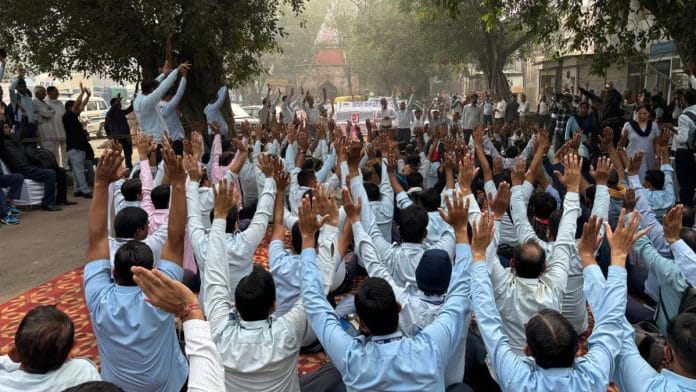New Delhi: Delhi Transport Corporation (DTC) employees gathered outside the DTC headquarters in New Delhi Wednesday in a large-scale protest, demanding fair wages, job security and improved working conditions.
The demonstration was organised by the DTC Karamchari Ekta Union and included bus drivers, conductors and home guards, many of whom carried placards and chanted slogans against the Aam Aadmi Party (AAP)-led Delhi government.
The protest, however, did not disrupt DTC services in the Capital as many employees joined it after completing their shifts, following a notice issued by the management a day earlier that warned them of severe consequences if they took leave Wednesday.
Speaking to ThePrint, several expressed frustration over low pay, lack of regular salary hikes and benefits such as health insurance and job security, particularly for contractual staff.
Union president Lalit Chaudhary told ThePrint that these issues had persisted for years, causing financial insecurity and dissatisfaction among DTC employees.
He also criticised the DTC’s heavy dependence on contractual workers, saying that the arrangement denied such workforce a stable income and benefits that permanent employees enjoy.
According to him, DTC currently employs about 28,000 contractual workers, compared to approximately 7,000 permanent employees.
The union’s primary demands include salary revisions to keep pace with inflation and permanent appointment of contractual staff.
“We are the backbone of Delhi’s public transportation, yet we are denied basic rights and security,” said Chaudhary. “Our demands are simple: fair wages, reasonable working hours and dignity in our jobs.”
Speaking about the formation of the union, Chaudhary said that it was originally known as ‘Aam Karamchari Union’ and had members from the AAP. However, after a protest in 2018, the DTC workers decided to separate from the AAP leaders and formed an independent union in October that year.
DTC Karamchari Ekta Union currently represents a broad range of DTC staff, including drivers, bus conductors, bus marshals, home guards and cleaning personnel.
Many union members at the protest site voiced concern about former Delhi chief minister and AAP National Convener Arvind Kejriwal’s “unfulfilled promise” made during his election campaign about granting permanent status to contractual employees of the DTC.
They further complained about insufficient overtime pay, alleging that they were compensated for just 30 minutes when they worked up to two hours extra.
Speaking to ThePrint, bus conductor Brijesh Kumar rued the steep penalties associated with taking leave.
“If you take a day off, not only is your wage deducted, but you receive a notice and can be fined Rs 2,000 to Rs 5,000. For daily wage workers like us, that’s impossible to bear. We work every day, even during festivals, without any holidays—it’s unfair,” he said.
According to Chaudhary, multiple complaints have been sent to Delhi Lieutenant Governor Vinai Kumar Saxena, but no action has been taken, forcing the DTC employees to protest.
As of now, the protesting employees have given the Delhi government 15 days to address their demands. If no action is taken, they plan to continue their protest until their demands are met.
ThePrint reached an AAP spokesperson via text messages. This report will be updated if and when a response is received.
Also Read: Forget free pass, DTC will have just 204 buses by 2025 as Kejriwal hasn’t bought any
‘Difficult to survive on this salary’
DTC operates a fleet of around 4,000 buses, which falls short of meeting Delhi’s public transport needs. The city requires nearly double this number, and the limited services lead to overcrowded buses, long waits and an increased reliance on personal vehicles. This, in turn, exacerbates traffic congestion and pollution in the Capital.
Delhi Integrated Multi-Modal Transit System, a public-private venture, supplements DTC’s services with approximately 3,500 cluster buses. While these cluster buses have helped to reduce some pressure on the public transportation system, the total fleet size remains insufficient for Delhi’s growing population.
Nitu Sharma, a woman bus conductor present at Wednesday’s protest, told ThePrint: “We work tirelessly every day, yet our wages are far from fair. It’s difficult to survive on this salary. At the very least, we need job security. Many contractual employees in DTC have been laid off without any reason.”
The DTC workers’ protest brings to focus the broader, longstanding challenges surrounding labour rights in India, particularly for contractual employees.
Despite laws such as the Industrial Disputes Act, 1947, and the Code on Wages, 2019, which aim to ensure fair wages, job security and safe working conditions, a large portion of the workforce is still excluded from these protections.
Unlike permanent staff, contractual employees are more vulnerable to exploitation via low wages, unpaid overtime and harsh penalties for taking leave.
(Edited by Nida Fatima Siddiqui)
Also Read: DTC to BEST—public transport a financial burden on states. New Modi govt must bring reforms






